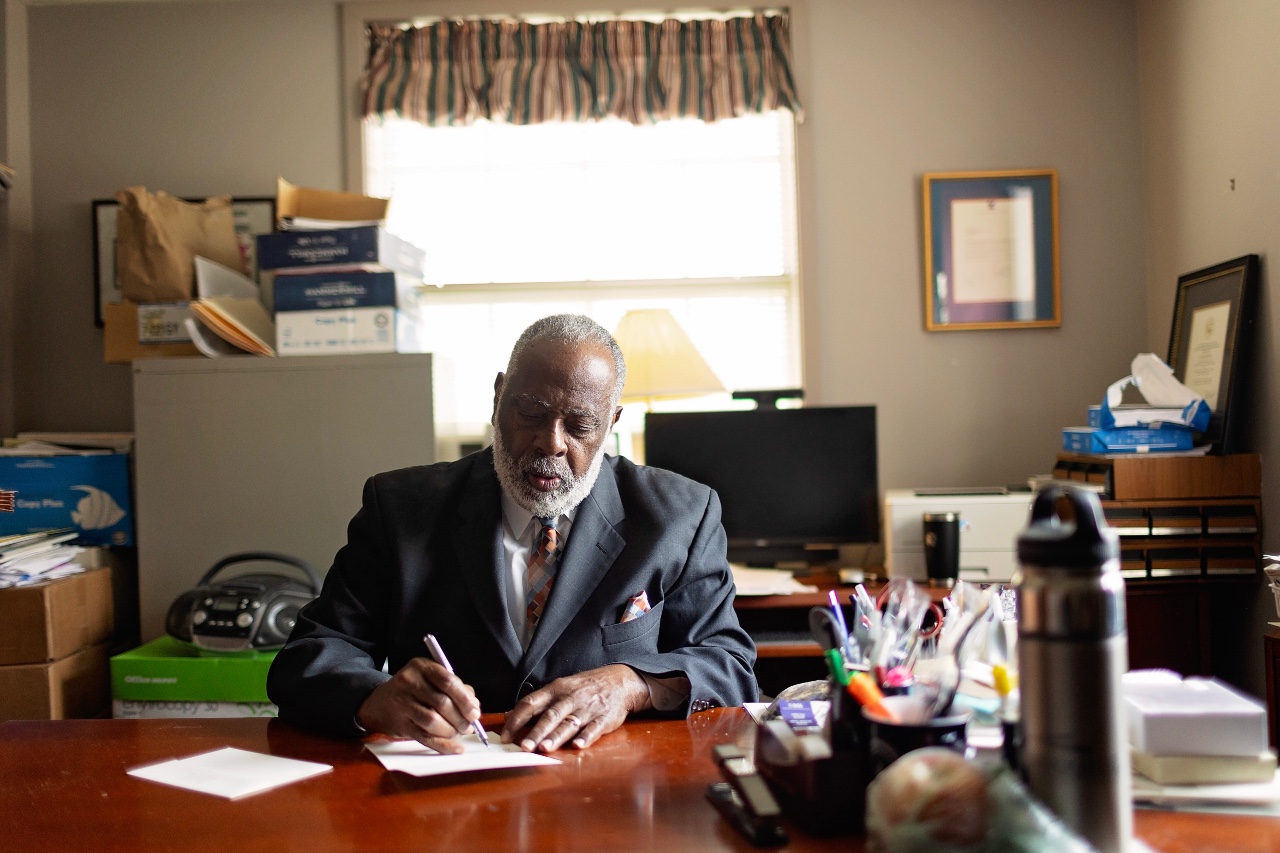
When Timothy George was preparing to hire a professor of preaching at Samford University’s Beeson Divinity School in 1997, he asked renowned theologians James Earl Massey and David Dockery for a recommendation.
“If you were starting a divinity school and preaching was most significant, and you needed help with teaching, who would you hire?” George asked them.
“Well, Dr. George, there is a person who would do a superb job…. if you can win him,” Massey said. “He is Dr. Robert Smith Jr.”
For George, Beeson’s founding dean, the search process was “over at that point.” He called Smith in January 1997 and asked him about joining the faculty at Beeson, which had been founded just about 10 years prior in 1988.
While George believed he’d found his man, Smith wasn’t so sure. Smith was just months away from earning tenure at The Southern Baptist Theological Seminary, where he served as the Carl E. Bates Chair of Preaching and had meaningful relationships there.
“I didn’t want to go to Beeson, not because of Beeson, because I didn’t know anything about Beeson,” Smith said. “I didn’t want to be 500 miles away from (my) home, and I didn’t want to leave my students at Southern Seminary.”
But his wife, Wanda, told him that “the Lord may be up to something,” and insisted he give Beeson a meeting.
Listening to his wife, Smith met with the search committee, but reiterated to them he had no plans on coming to Beeson. He had only come to “see if a bush was burning and if a voice was going to speak from the bush,” he said.
As it so happened, the bush did burn and the voice of God did speak that day, Smith said. The Lord was indeed up to something.
Now, 27 years later, as Smith retires from full-time teaching, the school he once wasn’t sure about joining has become a family, and a job he wasn’t sure he wanted has become a joy, one that has left its mark on a countless number of pastors, preachers and ministers.
“If he becomes a preacher, it will be because God told him.”
Robert Smith was born on May 26, 1949, to Robert and Ozella Smith. At 4 years old, his family moved to Cincinnati, where he still maintains a home.
Smith’s memories of growing up in Cincinnati are mostly good – playing baseball, collecting soda bottles to cash in for treats Church also played a key role in his upbringing.
“Church was a great memory. I was saved at 7 (years old) but even before then, I was taken to church and enjoyed it, and enjoyed being with the children there, going to Sunday School, having to know the golden memory verse, being given a quarter if you knew it by the pastor,” Smith said.
Smith’s conversion experience was, as he put it, quiet, unplanned and “uninfluenced in terms of what other young people may have done.”
“I sat under people who believed the Bible and people who were serious about Christianity,” Smith said.
Leading up to his salvation, Smith recalled hearing the gospel “not anew,” but in a different, compelling way.
“I’m still seeing through a glass darkly. And I trusted Christ by simple faith and believed and was saved,” Smith said.
After more than 60 years of following Christ, Smith said he’s still going ever deeper into what happened when God justified him.
“I can give you the Scriptures, but the experience is too wonderful,” he said.
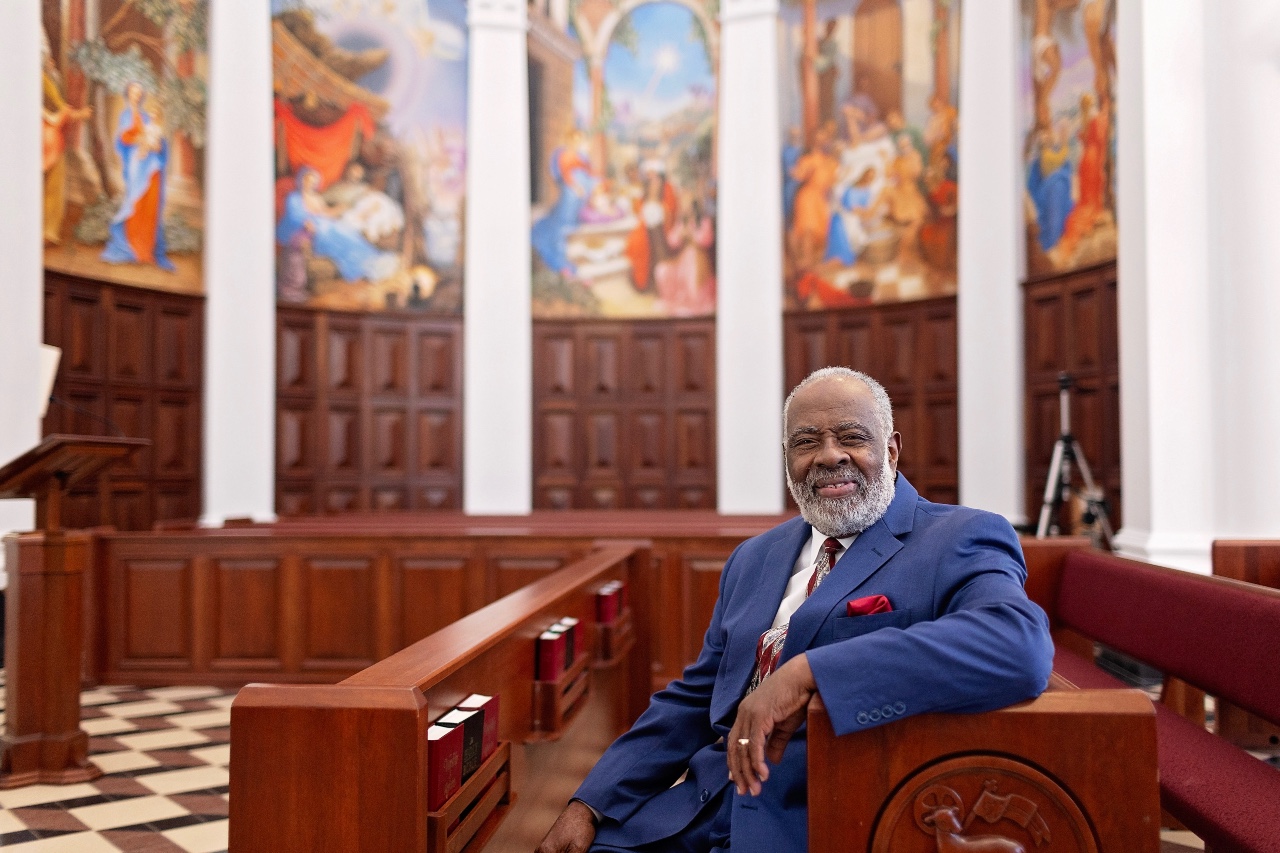
While an innumerable number of pastors and preachers have been shaped by Smith’s preaching and teaching, he was first shaped by the preaching and influence of his childhood pastor, E.L. Alexander.
“He discipled me,” Smith said. “My mother gave me to him like Hannah gave Samuel to Eli.”
As a junior deacon, Smith spent time around the senior deacons of his church, including his father. He was given the opportunity to read Scripture, sing and pray. He also learned early on the significance of theology and Baptist confessions, was required to know the 24 Articles of Faith in the Missionary Baptist tradition and more.
From an early age, he knew he wanted to teach the Bible. At age 14, he was teaching the deacons. He’d often invite neighbors into his home to study the Bible with him.
His zeal for God’s Word and God’s church led some to speculate God was calling him to preach. His mother would have none of that.
“People began to say, ‘You’re going to be a preacher; I see the mark on you,’” Smith said. “My mother would become angry. Don’t tell him he’s going to be a preacher. If he becomes a preacher, it will be because God told him. … Whatever God wants him to do is what he’s going to do.”
Turning Ink Into Blood
On June 10, 1966, on his father’s birthday, during a worship experience, Smith knew the Lord was calling him to preach.
A few weeks later, a 17-year-old Smith preached his first sermon, “Lord, I Shall Preach the Gospel,” taken from Luke 4:18-22: “The Spirit of the Lord God is upon me because He has anointed me to preach the Gospel to the poor.”
Nearly 60 years later, that first sermon still shapes him, serving as a guidepost on how to approach the text.
“I have taken that text, explored the text, lived at the address of the text, and then I have moved out into the zip code of supporting texts and Scripture to corroborate, examine, to buttress, to confirm, so that in essence the sermon is theocentric,” Smith said. “The sermon is pneumacentric, in terms of the Spirit. The sermon is Christocentric. It ends on an eschatological note. Well, that’s what I believe now. But it’s like a ripple. Now it’s widening and widening. I was doing then what I do now, but I did it unconsciously then.”
For 28 years, Smith served at the church his family was visiting when the Lord called him to preach, New Mission Baptist Church. He first served as an associate pastor for eight years, and later for 20 years as the church’s senior pastor.
“It’s been a marvelous journey, and a journey of great surprise and incredible providence,” Smith said.
In March 1967, Alexander invited Smith to preach at Shiloh Missionary Baptist in Newark, Ohio. The morning of the message, Alexander turned to him at the breakfast table and asked, “Bobby, you got your sermon?”
Smith showed him about 50 pages of notes he had compiled on John 8:12.
“Bobby, you need all this? You have 30 minutes to preach. You need all this? You can’t remember any of this, and you expect the people you’re going to preach to will remember what you are preaching on, and you can’t remember any of this without 50 pages?
“How do you expect them to remember what you can’t remember?” Alexander asked him.
Smith explained Alexander wasn’t against using manuscripts or outlines or notes. What Smith’s mentor wanted him to grasp, and what Smith has spent 27 years imparting to Beeson students, is that the sermon must be in them before they preach it to others.
“It's the best thing that ever happened to me in my ministry because he taught me that preparation is not just ink on paper. Preparation is turning ink into blood so that it gets in you,” Smith said. “You can preach it with the manuscript, with notes, with an outline. That's not the point. But is it in you? If it's not in you then I don't care how many pieces of paper that you have, then you're not ready to preach. Get it in you—not memorized but internalized.”
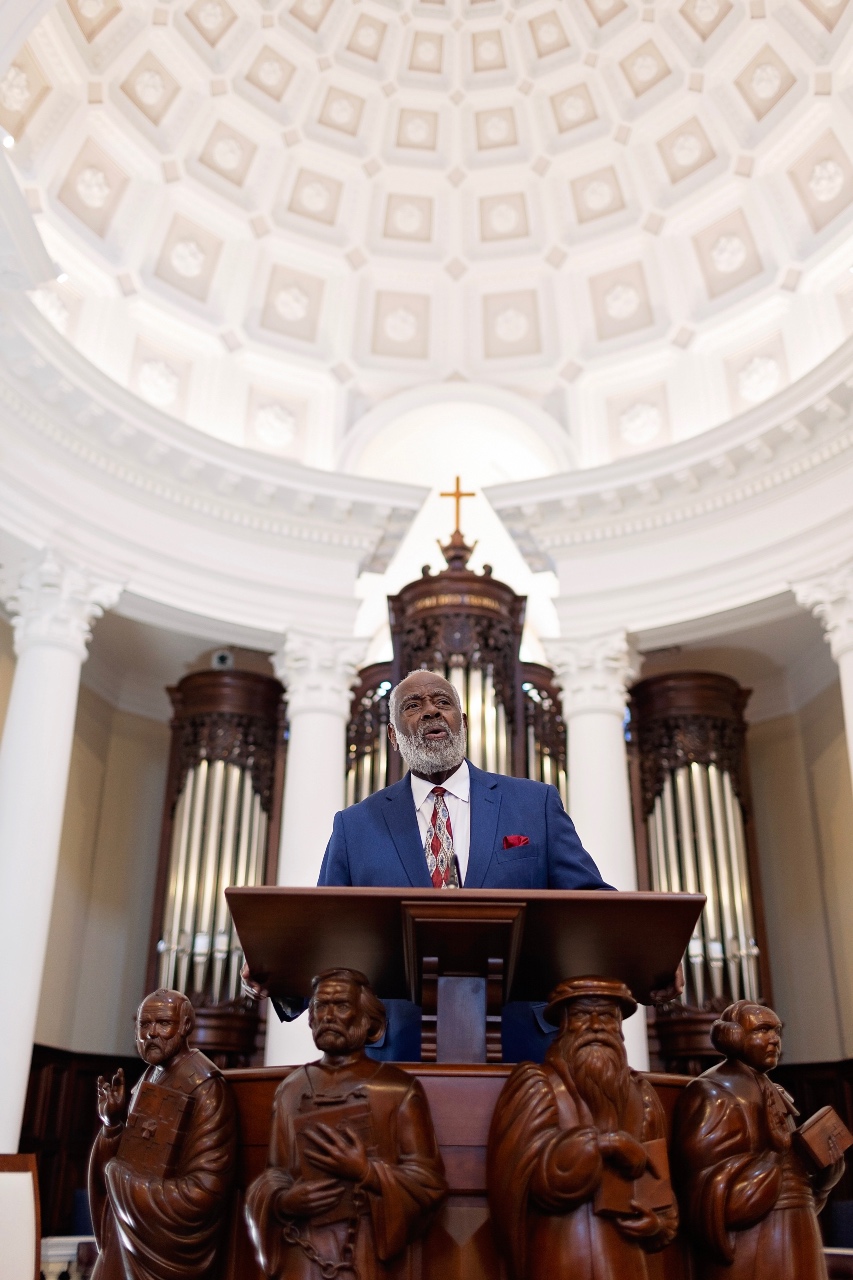
Take them to the throne room
The first lesson Smith taught his students at Beeson was that they could not preach.
“God has called you to do something you can’t do,” Smith said. “The only way to do something you can’t do is for God to do it through you. Preaching involves the power of God working through you. No matter how smart you are, how loquacious … you can’t preach. You can make speeches and utterances. But preaching … not just information, but transformation, you can’t do that unless God does it through you.”
Preaching, Smith said, is the ushering of people by the Word of God into the presence of Christ the Son of God through the power of the Spirit of God for the purpose of transformation. It is an explicitly Trinitarian task, and one that, once the hearer has entered into God’s presence, is complete from the preacher’s point of view, he said.
“In the throne room … transformation takes place,” Smith said. “I’m not involved in that. I don’t get involved in the Triune God’s throne room. I lead them to it. And then the door is shut.”
As transformation happens, Smith said his role, and the role he wants his students to understand they will have, is to disciple and mature.
“If I do my job and exegete the Scripture as I should, then my job is over,” Smith said. “I have nothing to do with transformation. (God) does. Now it’s my job to move that child from infancy toward maturity. I don’t want them to remain in a state of infancy. I want them to be ready for the army.”
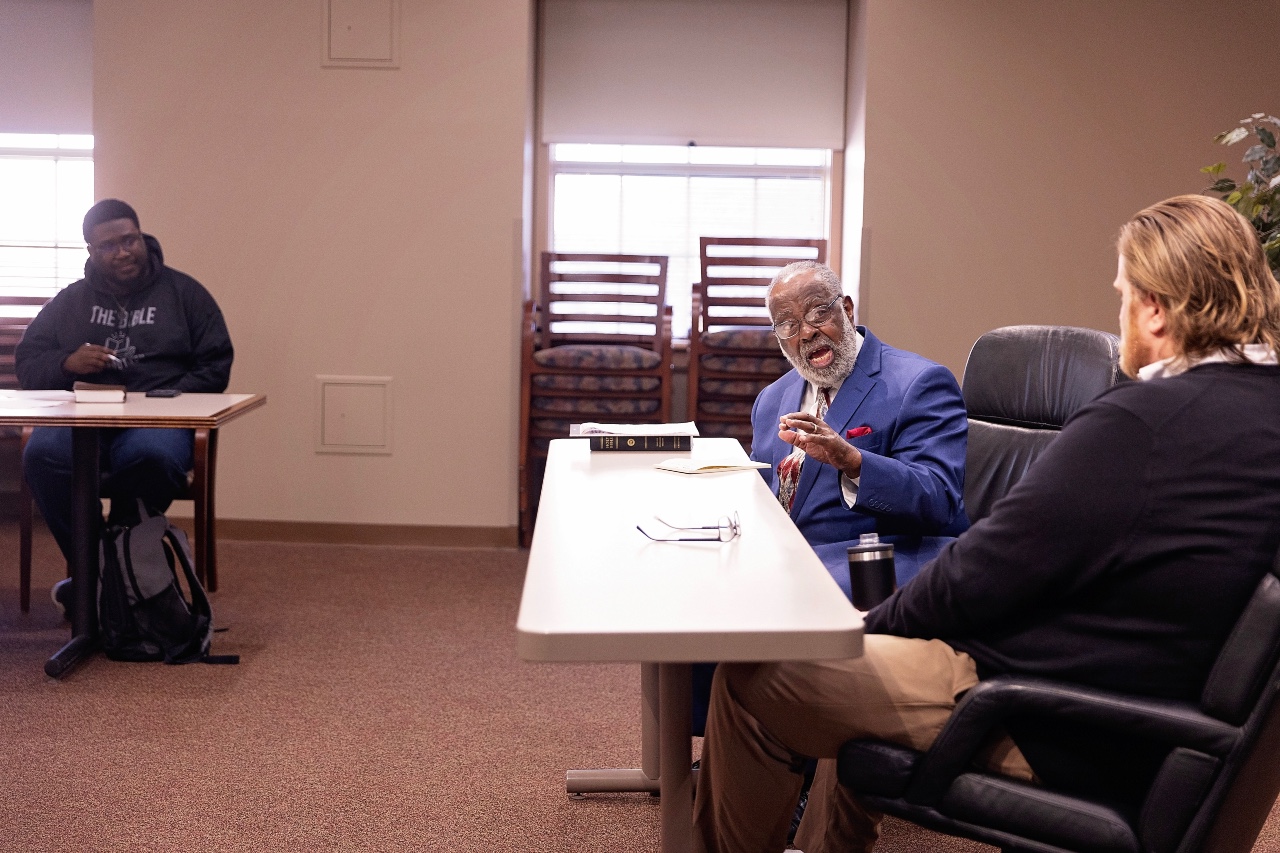
How Do You Sing at Night?
Smith is no stranger to suffering. In 1984, he preached the funeral for his first wife, Gayle, who died unexpectedly. One son, Tony, was murdered in 2010, the victim of an attempted robbery. Last spring, his son Robert III died after a 15-year battle with cancer.
When Gayle died, God asked Smith, “Do you really believe what you preach?” Smith said.
“I’ve been telling people you’ve got to go through the valley of the shadow of death. You can’t go around it,” Smith said. “Your people will be watching you. Do you have the faith you tell them they should have, or are you going to wilt; are you going to deny the goodness of God when something in life breaks your heart?
“People want to know whether or not faith works, not just when you’re mouthing faith from the pulpit but when you’re living faith from the depths of your pain,” Smith said.
Walking through the valley forced Smith to wrestle with whether he can and will praise God in the bad times as well as the good times, whether he can, as Charles Spurgeon once said, “sing when it’s time to sigh, to feast when it’s time to fast.”
“What do you do when life breaks down?” Smith said. “Can you experience God breaking through? That’s been the challenge. Does faith and life match, or is faith just something that has to be categorical? Can it be all inclusive of life?”
Thankfully, Smith said while he has “been to the bottom,” he has found that “the bottom is solid.”
In those times of deep pain, he’s benefited from the friendships and love of the Beeson community. Longtime professor Gerald Bray drove from Birmingham to Cincinnati to attend the funeral of his oldest son.
“Why? He loves me,” Smith said. “That goes for many of the men and women here.”
Depending once again on the Prince of Preachers, Smith recalled a sermon Spurgeon preached on Job 35, where he described the call of God to trust Him and to worship Him in suffering with the work of the nightingale.
“The nightingale is distinctive in that other birds that sing put on their concerts during the day, but the nightingale sings in the night,” Smith said. “That’s the whole idea. It’s easier to sing during the day, but how do you sing at night?”
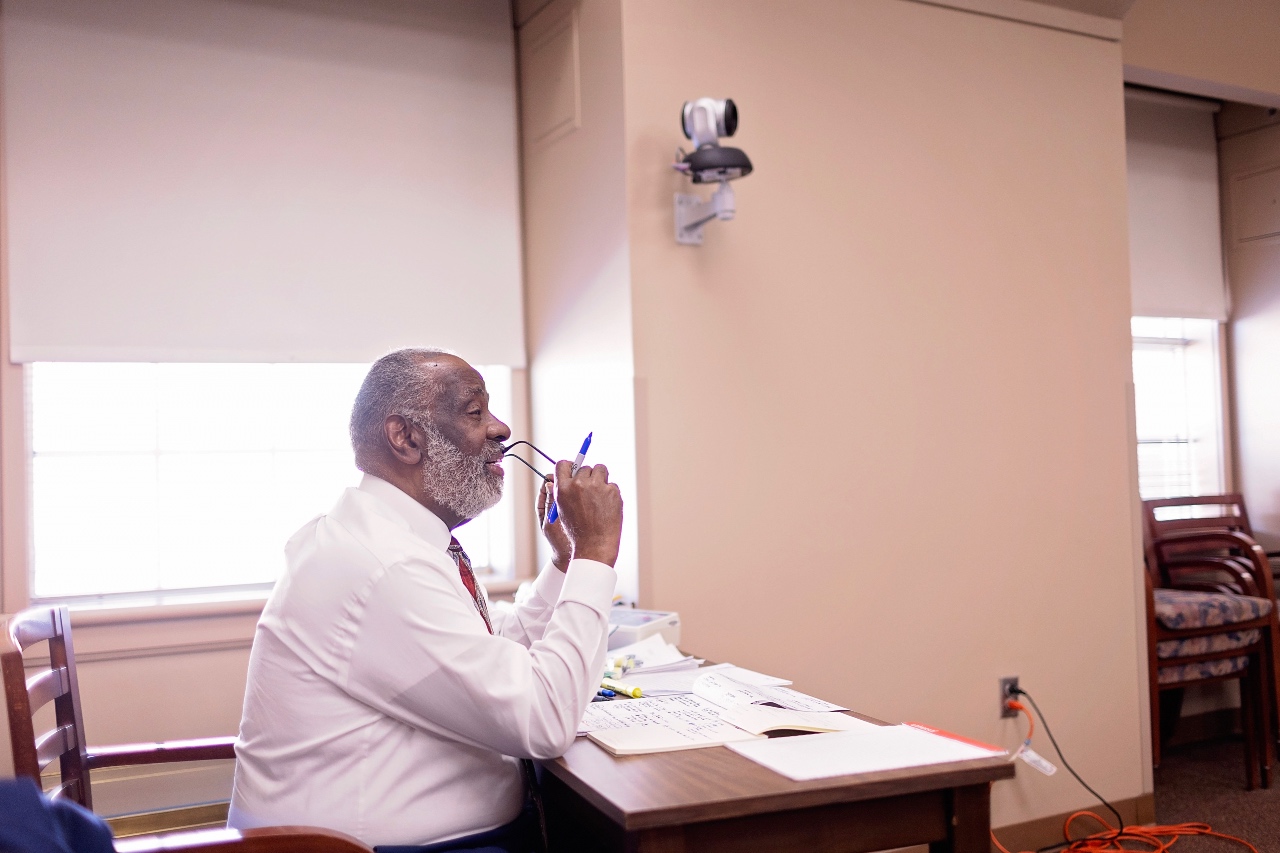
Beeson’s Pastor
At 8 and 9:30 a.m. on Tuesdays and Thursdays for the past 27 years, Smith opened each of his classes by asking students, “Is there anything we need to take to our Father as a family to pray about?” After prayer, he would teach or sit and listen as students preached, evaluating their work to help them sharpen their skills as a minister of God’s Word.
While his preaching and preaching classes are legendary, so too are the close relationships he’s formed with students during his time at Beeson, not just as a professor, but as a pastoral figure and friend, as someone who aspired to “write in the lives of (his) students” and is often referred to as “Beeson’s pastor.”
“I’m a pastoral professor,” Smith said. “That’s just me. That’s the way God has given to me. If I couldn’t do it that way, I couldn’t do it at all.”
His relationships with students have been such that some have named their children after him. He’s eaten in their homes, slept in their chairs, held their babies, been to their funerals and officiated weddings, and while he said he doesn’t deserve that, he’s grateful for it.
“They’ve become my family,” Smith said. “Relationships are … central to everything that’s happened to me.”
In addition to leaving a lasting impression on students, Smith has also left a mark on his fellow faculty members.
“I have come to know and value Robert Smith as a brother in Christ and good friend,” said professor Mike Pasquarello, who also retired this year. “I will continue to cherish our friendship in retirement, as we will be living not far from each other. I look forward to getting together with Robert for good times of fellowship while taking in an occasional Cincinnati Reds game. Of course, I have always enjoyed my conversations with Robert about anything having to do with preaching, a love we both share. And I will remember fondly his cheerful greetings from the other end of the hall on the third floor of Divinity South. I am especially thankful for the privilege of establishing and directing the Robert Smith Jr. Preaching Institute which honors him for his faithfulness and excellence in the ministry of the Word.”
“Robert Smith is one of the most influential preachers and teachers of preaching in the world—and yet no one invests more time, love and prayer in our students than he does," said Douglas A. Sweeney, dean of Beeson Divinity School. "Hundreds around the world count him as a spiritual father. We will miss him in the classroom but are pleased to say that he plans to visit and minister at Beeson frequently in years to come.”
There are certain “Beeson facts” that are beyond question in George’s mind.
“God put it into the heart of Ralph Waldo Beeson to endow a new theological school on our campus in 1988. God brought together a wonderful nucleus of students, staff and faculty to begin this work,” George said. “God gave Robert Smith a holy hunch that this new community was where he should invest his considerable talents and gifts for Christ.
“As they say, the rest is history…history lived in part, and history still in the making,” George said. “Thank you, Lord, for Robert Smith, Beeson’s jewel of love and learning. Bless him and keep him ever in your grace and providential care.”
Saying Goodbye
As he’s prepared to step away, Smith said he’s “sailing uncharted waters and … traveling under sealed orders.”
While he’ll keep an office at Beeson and will remain in relationship with the Beeson community, he’s not sure what comes next.
“I don’t know, but I know who knows, and that’s enough for me,” Smith said.
Smith said his time at Beeson was filled with more than just teaching classes, grading papers and evaluating sermons.
“I’ve been on the playground of the (Holy) Spirit,” Smith said. “And I’ve been having a sense of holy hilarity, holy fun. It’s been fun. I haven’t endured this experience; I’ve enjoyed it. It hasn’t been a duty; it’s been a delight. It hasn’t been a job; it’s been a joy.”
He knows that now is the time to walk away, not because his passion is dropping, but because the Lord has told him that it is time.
“Many have expressed a desire for me to stay,” Smith said. “I don’t deserve it, but I’m grateful for that kind of regard.”
Now that he’s retired, Smith doesn’t know what he’s going to do at 8 a.m. on Tuesdays and Thursdays anymore, except spending the early morning hours reading and writing in his office.
Or, more than likely, he’ll find his way back to Beeson. He’ll slip into a classroom and listen to his friends as they teach. He’ll knock on doors and hug necks. He’ll sit in chapel and pray with the faculty, staff and students he loves so much.
“This is not a place,” Smith said. “It’s a family to me.”
